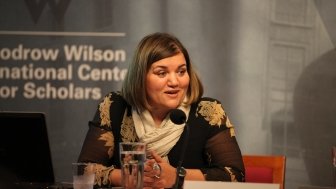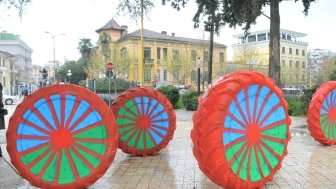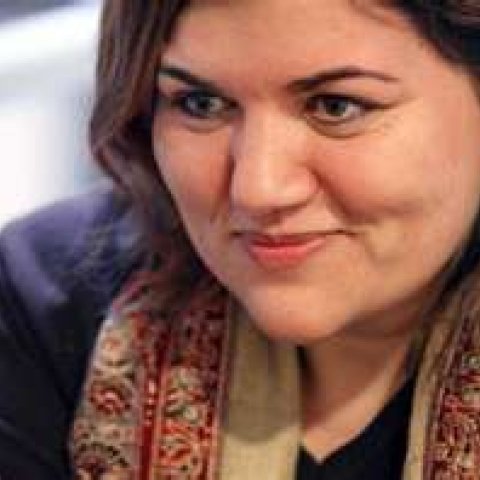Angela Kocze
Ion Ratiu Scholar
Professional Affiliation
Visiting Assistant Professor, Wake Forest University
Expert Bio
Angela Kocze, PhD is sociologist. Currently she is a Visiting Assistant Professor at the Wake Forest University. She is also research fellow at the Hungarian Academy of Sciences, Institute of Sociology and affiliated research fellow at the Central European University, Center for policy Studies. Dr. Kocze has done several research mainly focused on social and legal inequalities of Roma in the various European countries as well as the intersection of gender ethnicity and class regarding minority and migrant population in Europe. She has written extensively about the racialization and the unequal access to social, economic and political rights of Roma in Europe. Some of her work was published in various books by Palgrave, Ashgate as well as international organizations such as UNDP. Dr. Kocze besides her academic career also worked as a senior policy adviser in the Hungarian government (2004-2008). Previously to gain her PhD, she worked as a funding director of the European Roma Information Office (ERIO) in Brussels (2003-2004), as well as the former director of the human rights education program at the European Roma Rights Centre (1998-2003) in Budapest, Hungary. Moreover, she was the founding director of the Romaversitas program (1996) in Budapest which offers a scholarship and mentorship for underprivileged Roma minority university students.
Wilson Center Project
"Democracy, Human Rights, Entrenched Poverty: Political Dispossession of Roma in Contemporary Europe"
Project Summary
During the last two decades contemporary European societies have experienced remarkable economic, political and social transformations following the collapse of the Soviet Union and its satellite states with the neoliberal restructuring of post-WWII welfare systems in Western, as well as Eastern Europe, the disintegration of Yugoslavia in the 1990s, the enlargement of NATO (North Atlantic Treaty Organization) and the European Union to include former socialist countries and growing economic inequalities and crisis defining this period. This new economic and political restructuration has brought an affirmation and consolidation of neoliberal policies in the enlarged Europe. (Sigona and Trehan 2009:1) Many researchers recognized that one of the most visible by-products of the so called neo-liberal phenomenon have been the increasing social exclusion, pauperization, racial discrimination and territorial segregation of Romani citizens in the European countries, particularly in Central and Eastern European states (Ladányi-Szelényi 2006 )
My research questions are the following:How Roma structural positions are framed by the political elite? What kind of representational practice exist about the internally heterogeneous but externally seen as a homogenous Roma population, in Europe? Are there any similar framing strategies in European public discourse which influence and contribute to the politics of double discourse/ politics of hypocrisy at trans-national as well as at the national level?
Major Publications
Missing Intersectionality: Race/Ethnicity, Gender, and Class in Current Research and Policies on Romani Women in Europe.by Angela Kocze with contribution from Raluca Maria Popa, Policy Papers, CEU Center for Policy Studies, CEU Press, 2009
“Pro-Roma Global Civil Society: Acting for, with or instead of Roma?” by Angela Kóczé and Martin Rövid in Mary Kaldor, Henrietta L. Moore and Sabine Selchow, Global Civil Society 2012: Ten Years of Critical Reflection, Basingstoke: Palgrave Macmillan. (2012. pp. 110-122.)
Kóczé, Angéla. (2012). Civil Cociety, Civil Involvement and Social Inclusion of the Roma. Roma Inclusion Working Papers, edited by Andrey Ivanov and Jaroslav Kling Bratislava: United Nations Development Programme, ISBN for the printed version: 978-92-95092-62-4
Previous Terms
Public Policy Scholar; Ion Ratiu Democracy Award Recipient, Apr 2014- May 2014
Insight & Analysis by Angela Kocze
- Past event
- Democracy
The Roma and Human Rights: Challenges and Goals in 2014 – Lessons from the Past, Eyes to the Future

- Article
- Democracy
Ion Ratiu Democracy Awardee, Angela Kocze, Speaks for VOA's Press Conference USA

- Past event
- Democracy
Political Dispossession of Roma in Contemporary Europe

- Article
- Democracy
Angela Kocze to Receive the 2013 Ion Ratiu Democracy Award


